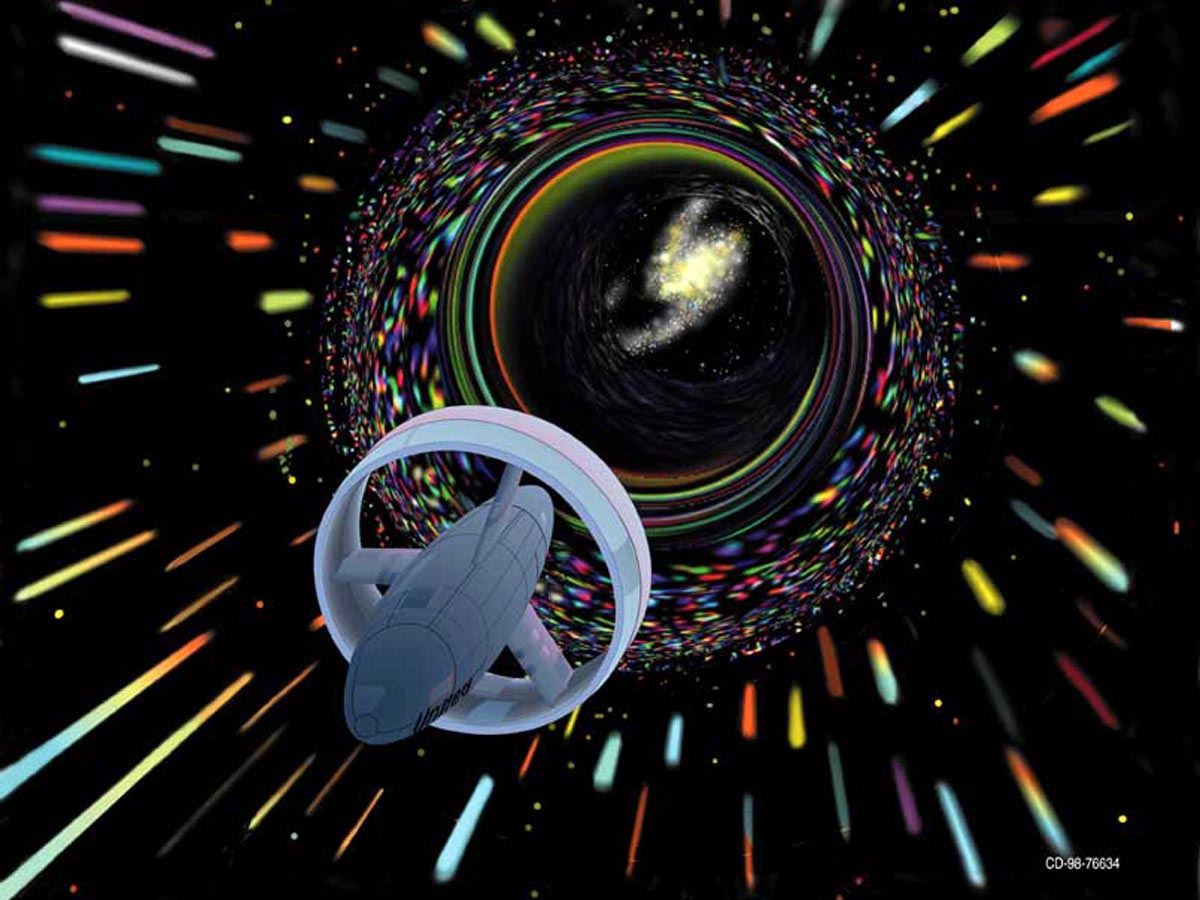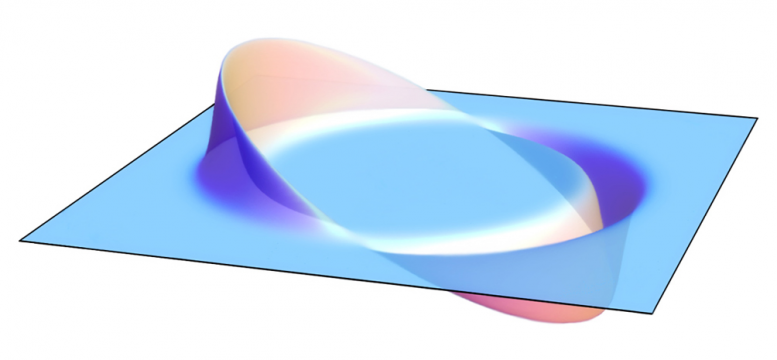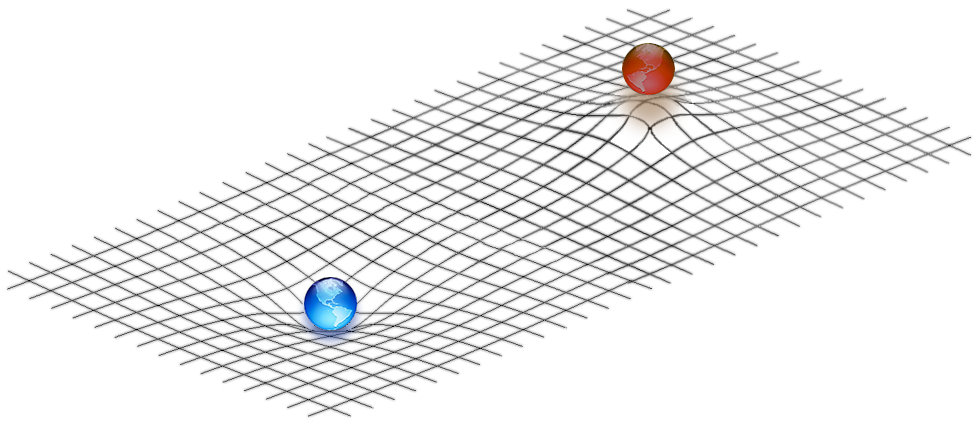
Posted on 05/18/2021 12:11:52 PM PDT by Red Badger

Faster than light travel is the only way humans could ever get to other stars in a reasonable amount of time. Credit: NASA
The closest star to Earth is Proxima Centauri. It is about 4.25 light-years away, or about 25 trillion miles (40 trillion km). The fastest ever spacecraft, the now-in-space Parker Solar Probe will reach a top speed of 450,000 mph. It would take just 20 seconds to go from Los Angeles to New York City at that speed, but it would take the solar probe about 6,633 years to reach Earth’s nearest neighboring solar system.
If humanity ever wants to travel easily between stars, people will need to go faster than light. But so far, faster-than-light travel is possible only in science fiction.
In Issac Asimov’s Foundation series, humanity can travel from planet to planet, star to star or across the universe using jump drives. As a kid, I read as many of those stories as I could get my hands on. I am now a theoretical physicist and study nanotechnology, but I am still fascinated by the ways humanity could one day travel in space.
Some characters – like the astronauts in the movies “Interstellar” and “Thor” – use wormholes to travel between solar systems in seconds. Another approach – familiar to “Star Trek” fans – is warp drive technology. Warp drives are theoretically possible if still far-fetched technology. Two recent papers made headlines in March when researchers claimed to have overcome one of the many challenges that stand between the theory of warp drives and reality.
But how do these theoretical warp drives really work? And will humans be making the jump to warp speed anytime soon?

This 2-dimensional representation shows the flat, unwarped bubble of spacetime in the center where a warp drive would sit surrounded by compressed spacetime to the right (downward curve) and expanded spacetime to the left (upward curve). Credit: AllenMcC/Wikimedia Commons
Compression and expansion Physicists’ current understanding of spacetime comes from Albert Einstein’s theory of General Relativity. General Relativity states that space and time are fused and that nothing can travel faster than the speed of light. General relativity also describes how mass and energy warp spacetime – hefty objects like stars and black holes curve spacetime around them. This curvature is what you feel as gravity and why many spacefaring heroes worry about “getting stuck in” or “falling into” a gravity well. Early science fiction writers John Campbell and Asimov saw this warping as a way to skirt the speed limit.
What if a starship could compress space in front of it while expanding spacetime behind it? “Star Trek” took this idea and named it the warp drive.
In 1994, Miguel Alcubierre, a Mexican theoretical physicist, showed that compressing spacetime in front of the spaceship while expanding it behind was mathematically possible within the laws of General Relativity. So, what does that mean? Imagine the distance between two points is 10 meters (33 feet). If you are standing at point A and can travel one meter per second, it would take 10 seconds to get to point B. However, let’s say you could somehow compress the space between you and point B so that the interval is now just one meter. Then, moving through spacetime at your maximum speed of one meter per second, you would be able to reach point B in about one second. In theory, this approach does not contradict the laws of relativity since you are not moving faster than light in the space around you. Alcubierre showed that the warp drive from “Star Trek” was in fact theoretically possible.
Proxima Centauri here we come, right? Unfortunately, Alcubierre’s method of compressing spacetime had one problem: it requires negative energy or negative mass.

This 2–dimensional representation shows how positive mass curves spacetime (left side, blue earth) and negative mass curves spacetime in an opposite direction (right side, red earth). Credit: Tokamac/Wikimedia Commons, CC BY-SA
A negative energy problem Alcubierre’s warp drive would work by creating a bubble of flat spacetime around the spaceship and curving spacetime around that bubble to reduce distances. The warp drive would require either negative mass – a theorized type of matter – or a ring of negative energy density to work. Physicists have never observed negative mass, so that leaves negative energy as the only option.
To create negative energy, a warp drive would use a huge amount of mass to create an imbalance between particles and antiparticles. For example, if an electron and an antielectron appear near the warp drive, one of the particles would get trapped by the mass and this results in an imbalance. This imbalance results in negative energy density. Alcubierre’s warp drive would use this negative energy to create the spacetime bubble.
But for a warp drive to generate enough negative energy, you would need a lot of matter. Alcubierre estimated that a warp drive with a 100-meter bubble would require the mass of the entire visible universe.
In 1999, physicist Chris Van Den Broeck showed that expanding the volume inside the bubble but keeping the surface area constant would reduce the energy requirements significantly, to just about the mass of the sun. A significant improvement, but still far beyond all practical possibilities.
A sci-fi future? Two recent papers – one by Alexey Bobrick and Gianni Martire and another by Erik Lentz – provide solutions that seem to bring warp drives closer to reality.
Bobrick and Martire realized that by modifying spacetime within the bubble in a certain way, they could remove the need to use negative energy. This solution, though, does not produce a warp drive that can go faster than light.
Independently, Lentz also proposed a solution that does not require negative energy. He used a different geometric approach to solve the equations of General Relativity, and by doing so, he found that a warp drive wouldn’t need to use negative energy. Lentz’s solution would allow the bubble to travel faster than the speed of light.
It is essential to point out that these exciting developments are mathematical models. As a physicist, I won’t fully trust models until we have experimental proof. Yet, the science of warp drives is coming into view. As a science fiction fan, I welcome all this innovative thinking. In the words of Captain Picard, things are only impossible until they are not.
Written by Mario Borunda, Associate Professor of Physics, Oklahoma State University.
Originally published on The Conversation.
“the space between Alpha Centauri and Earth is not actually changing, as anyone who measures it from either Earth or Alpha Centauri, or any other point in the universe can confirm. Only YOUR measurement is changing.”
This entirely misses a central point of special relativity: there is no such thing as THE distance between A and B. Any measurement in an inertial frame of reference is as valid as any other.
Those are interesting ideas, and you are very right that ultimately the mind of God is unknowable.
My main issue is that, as you point out, everything seems to have been very well designed for us. The laws of physics seem perfectly written to support beings like us, and they also have a beautiful simplicity to them.
The universe beyond our solar system doesn’t seem designed with us in mind. Perhaps it isn’t. I suppose my worry is how much we matter to a God who has also created trillions of other worlds, if those worlds are not also eventually meant for us.
FTL is the only way to get to other stars ... other than all the other possible ways - cf: James Clerk Maxwell.
In simplest terms that leave out all the details, the Space-Time coordinates establish a light cone the boundaries of which represent a light beam's trajectory and which cannot be crossed by either the time coordinate (which represents the path of an object in an inertial frame) or the space coordinate (which lies outside the light cone)...
However, there are instances where the "observed" speed of light is slowed down as the light beam passes through a solid like water... then you can see the results of certain charged particles traveling faster than that light through the same medium...
Cherenkov radiation is the best example...
Including the blue glow of a nuclear cooling container or detecting the Cherenkov radiation from a muon from space passing through a block of plexiglass...
Also, quantum entanglement has information passing between objects faster than the speed of light... (Einstein's "spooky" meme)
Finally, the universe (way way way)?? out there is most likely expanding faster than the speed of light...
I'll close by pointing out a critical case of superluminal speed... Consider the speed by which our new ruling communists have attacked all of our unalienable freedoms & liberties...
I feel there has to be some method of FTL travel that is possible. Otherwise why would everything out there exist?
One of Maxwell’s postulates was that it is possible to step from any given point in the universe to any other without time or energy debt ... but no one reads him except a few solitary theoretical mathematicians. Only Tesla tried to make a practical device from Maxwell - the broadcast of free electrical energy.
Maxwell should be more famous than Einsten, Tesla, and Newton.
His equations were remarkable especially given the time period he worked in.
You’re way behind the curve- Einstein already created the theory of relativity.
And many experiments proved it to be true. A black hole is proof of it.
Some people argue that Maxwell just took what was already known and put it into a more usable mathematical form it “ a system” and did nothing creative. I disagree !
Much of the worldly press talks about possible worlds by focusing on the "goldilocks" planets. They talk as though that about the only parameter you need is for the planet to be just close enough to its host star (or stars) for water to not freeze, but just far enough away for water to not evaporate. I proport to you that they put so much focus on that one parameter that they want you to forget that there are literally thousands of parameters for a planet to be just right for advanced life. Such as:
The age of the planet relative to the age of its host star. An young star or a young planet can't host life. Nor can an old planet or old star. Our Earth happens to be just the right age, coincidentally at the same time the sun is at the right age.
The fact that there is just enough tectonic activity on Earth to stir up the heavy elements from deep within the planet and at the bottoms of the oceans for us to survive (our bodies need trace elements of heavy elements, including gold), while not enough to have too much of the heavy elements (gold is poisonous if we have too much) nor have too many earthquakes, tsunamis, and volcano eruptions to kill us all.
The fact that only Earth has a big brother size Jupiter planet that's just big enough and close enough to Earth to suck in comets and asteroids into its massive gravity well (preventing them from hitting Earth and causing Life Extermination Events every few hundred years like what killed the dinosaurs), but not so close and massive enough to cause too much tectonic activity on Earth or mess up the orbit.
And on and on and on.
I would love to see it happen.
That ‘quote’ is really a stolen paraphrase of a Robert Heinlein quote, a real person...................
Everybody starts with something known before they create something new
The Universe is ‘round’ like a globe.
If it’s too far one way, just go the other way........................
Time Travel is impossible.....................
The Expanse has the Epstein Drive for jaunts around the solar system.
“Any measurement in an inertial frame of reference is as valid as any other.”
Of course, when you are doing the math. Yet, when it comes to reality, it’s still quite obvious that not all reference frames will represent an accurate picture of objective reality. For example, if you were moving at the speed of light towards Alpha Centuari, the distance between the sun and AC shrinks to ZERO, from your perspective, but still, the two stars would not collide with catastrophic consequences. So while your reference frame would be completely valid mathematically, it is NOT as valid a representation of reality as just about any other reference frame you could pick.
Your example doesn't apply, as special relativity does not allow light-speed travel. (The FTL travel of the article involves stretching distances behind the traveler, so zero separation again does not apply.)
One could point out that near-light-speed travel would bring the stars into arbitrarily close proximity. But many other observations would also change, e.g, the shape of the stars; if one works out ALL the physics, no laws are violated in the traveler's frame of reference.
“Your example doesn’t apply, as special relativity does not allow light-speed travel.”
Of course it does. Zillions of photons are traveling at the speed of light right now, perfectly in accordance with special relativity. It just doesn’t allow you to accelerate a massive object to the speed of light (in the spatial dimensions).
“if one works out ALL the physics, no laws are violated in the traveler’s frame of reference”
Which is not the same as saying that their perspective, in their frame of reference is as accurate depiction of objective reality as every other. The math may work perfectly well, but the conclusions you draw may not be the correct ones, if your perception of reality has been skewed, for example by the relativistic effects that I’ve already mentioned.
Barking nonsense; math is the language of physics, so if the math works then the physics applies.
“math is the language of physics, so if the math works then the physics applies”
Sure, but physics is still just an attempt to approximate reality, and shouldn’t be ontologically confused with reality itself. If your physics tells you that in some circumstances, an entire dimension of space collapses and the universe becomes 2-dimensional (as relativity does in some reference frames), that does not mean that, in reality, the universe is actually collapsing into 2-dimensions. THAT would be “barking nonsense” to interpret the physics in that manner.
Disclaimer: Opinions posted on Free Republic are those of the individual posters and do not necessarily represent the opinion of Free Republic or its management. All materials posted herein are protected by copyright law and the exemption for fair use of copyrighted works.